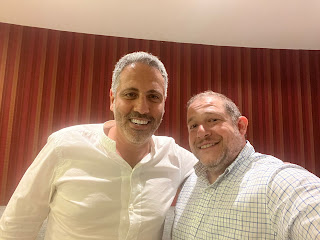One of the most amazing things I experience when I come to Israel has to do with the chance encounters that you could not plan. It seems like every time I come here, I run into someone at the most unexpected and yet totally natural places. But that’s kind of the entire experience of being here - we run into all kinds of unexpected things - places that strike us with the weight of history, societal challenges that are filled with complexity, stories that become our own. Traveling to Israel becomes a surprise encounter with ourselves.
Speaking of chance encounters … Last night, I joined a few people from the trip in going to the big Democracy demonstration in Tel Aviv. Over 120,000 people came to the streets in a peaceful, organized, spirited fashion - filled with Israel flags and hope and camaraderie.
Among those 119,996 other people were Gil and Maya, former congregants from Raleigh. Gil had seen I was in town, and said to his brother, “what are the odds we run into rabbi Ari?” … well, whatever those odds started at, they became 100%

It was amazing to see them and learn more about the organizations supported by Gil’s niece. She mentioned the vast number of Israeli organizations who are part of these demonstrations, which is incredible, since usually any three Israeli organizations have trouble agreeing on anything. They gave me my own bamboo pole flag and made me a demonstrator as opposed to an observer. The only conflict we experienced was the awkward moment when my current and former congregants started a light-hearted “come back … you can’t have him” debate, though it was way less awkward then if it had been a “you can have him … we don’t want him” argument.

These demonstrators oppose the current government’s attempts to weaken the judiciary branch, allowing it to essentially become a pawn of the executive and legislative branches of government, as opposed to a partner/check-and-balance. The courts have been the protectors of the minority in this country, ensuring their rights alongside those who are in a majority. It was inspiring to see young, old, families, lgbtqia+, Jewish, Muslim … almost all demographics in Israel (except for religious right - as expected, I didn’t any of see them). It was inspiring to see how much passion and care the people have over these issues. And as a speaker at the rally said (I’m doing my best to translate) “Each one of us” … from the academics, to the street vendors, to the medical professionals to the teachers … “We are the hope, the hope of two thousand years.”
Here are people leaving the rally:

In addition to the street encounter, I also got to reconnect with a friend from high school, who happened to be in town 5 minutes from my hotel. Funny thing is that last time we saw each other was 18 years ago, when he was in Israel, visiting from Shanghai, and I was studying to be a rabbi in Jerusalem… so great to catch up, Eric!! Here’s your #selfiewiththerabbi
Other highlights and visits included:
The special Ayalon institute, home of the secret ammunition factory created before Israel’s war of independence. Check out this picture on the wall, right-most person … is it possible that Laila was one of the Hagganah youth recruited for the resistance?

We saw birds in nature
Murals in Tel Aviv
Ancient ruins in Caesaria
(Along with ancient toilets)
Here was a new experience for me: the Sindayanna Center of Galilee - a joint Jewish and Arab venture to empower Israeli-Arab women, give them skills to work and support themselves, and to make olive oil and zatar to distribute. Not only was it fun to make our own zatar, it was inspiring to hear from the women in charge and who are being empowered. The stuff we just don’t get to see on the news that shows glimmers of hope that peace can be possible.
There’s so much more interaction and coexistence than is ever written about in the media.
While at the bird observatory in the Hula Valley with our Israeli-Arab guide, we also saw some metal birds and heard the explosions of military battery (and saw the smoke from over the ridge) -a busy day for military exercises in the area.
And the trip is filled with fun, as well. Here’s a group singing “Doody Wiper” coming back from seeing the birds and the turtles and the water Buffalo and donkeys




















































